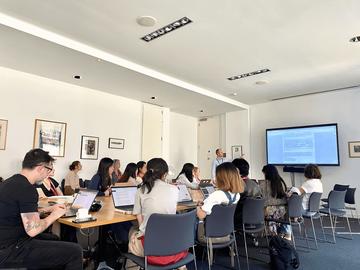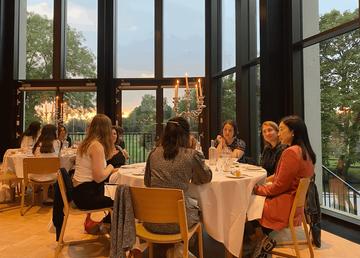Hana Irshaid was awarded a bursary to attend the Digital Humanities Oxford Summer School in 2024. To join the mailing list and learn about the next summer school sign up here. Read about Hana's experience at the summer school here:
I approached the AI & Creative Technologies strand at DHOXSS 2024 wearing two hats: as a museum education scholar at the University of Glasgow and as someone who had recently dipped their toes into DH research methods, following a semester at University College Cork’s Digital Arts and Humanities department. From the keynotes to the virtual strand and the in-person Enriching Exhibition Stories sessions, the programme truly catered to the evolving needs of GLAM (galleries, libraries, archives and museums) professionals.

Photo by Hana Irshaid
The school kickstarted with a thought-provoking keynote by Professor Andrea Wallace, who raised critical ethical questions about the entrenched power dynamics within copyright laws in the sector. She advocated for innovative frameworks to address issues such as data protection, indigenous data sovereignty, and the role of AI. Leaving the keynote, I found myself questioning my own practices as a museum professional, particularly regarding digital heritage asset management: Who decides what gets digitised and reproduced? How should the implementation of copyright policies account for diverse stakeholders and avoid creating "silent" datasets?
Building on these reflections, the AI & Creative Technologies virtual strand equipped me with an array of tools for creating resources in museums and cultural institutions. Professor David De Roure’s notion of “being a human and living in the moment with AI” struck a chord, and the sessions that followed seemed to embody the idea fully. Probing the history and evolution of machine learning and artificial intelligence, the strand traced these concepts’ genealogies and growing roles in knowledge infrastructures—not just as technical apparatuses, but as catalysts for creativity.
One especially memorable example was composer Robert Laidlow’s collaboration with an AI system that did far more than assist. This AI actively composed music in conversation with Laidlow, incorporating his musical themes and pushing them in new directions—a powerful demonstration of AI as a true creative partner. A playful spirit animated the sessions, as lecturers experimented with tools like ELIZA and modern platforms like Suno to generate content that is directly connected to the strand on the spot. This blend of engineers, composers, and artists offered a glimpse into a future in which AI reshapes how we imagine, create, and engage with culture in the most unexpected ways within GLAM.
The strand also highlighted the vast potential of game theory and design, 3D modelling, and extended reality technologies in cultural preservation and audience engagement. I especially appreciated the presenters’ emphasis on accessible, open-source tools that digital humanists, regardless of technical expertise or institutional support, could readily adopt. I was particularly thrilled to experiment with creating a 3D model in SketchUp and Sketchfab after the summer school, recognising their potential not only for safeguarding endangered tangible heritage but also as accessible and interactive educational tools. The programme replaced some of my misgivings about AI with genuine curiosity by showing how it can be employed in a non-extractive, ethical way. I left with a notebook brimming with resources, recommended readings, and software shared by the lecturers and attendees throughout our dynamic chats, which added yet another layer to the summer school’s learning experience.
The school concluded with Professor Nanna Bonde Thylstrup’s closing note, which offered deep insights into the politics of data loss and prompted me to reflect on the concept of data obsolescence and the technologies we rely on to safeguard digitised assets.
Beyond the academically rigorous experience, I had the pleasure of immersing myself in some of Oxford's offline activities, including a poster display and presentation of digital humanities projects from around the world at the Weston Library. I also had the chance to soak in the charm of Oxford, joining a guided tour through its historic streets and enjoying an unforgettable banquet dinner at St. Hilda’s College.
I am deeply appreciative of the bursary scheme and I have already recommended DHOXSS to peer DHers at various career stages who are eager to learn from the vast expertise of a phenomenal lineup of lecturers.

Photo by Hana Irshaid